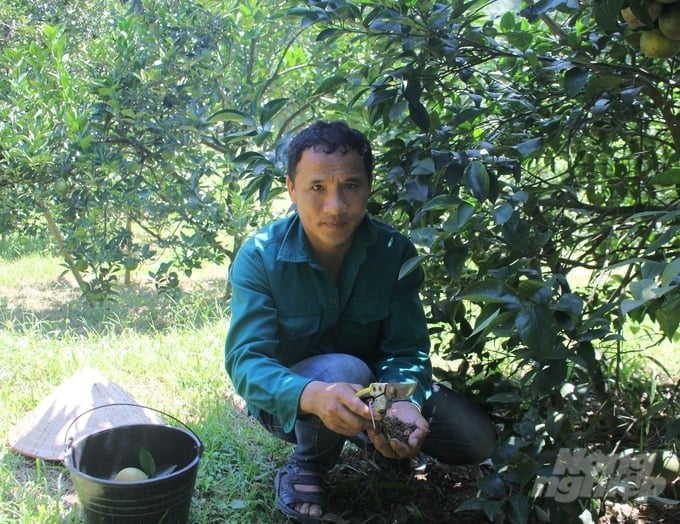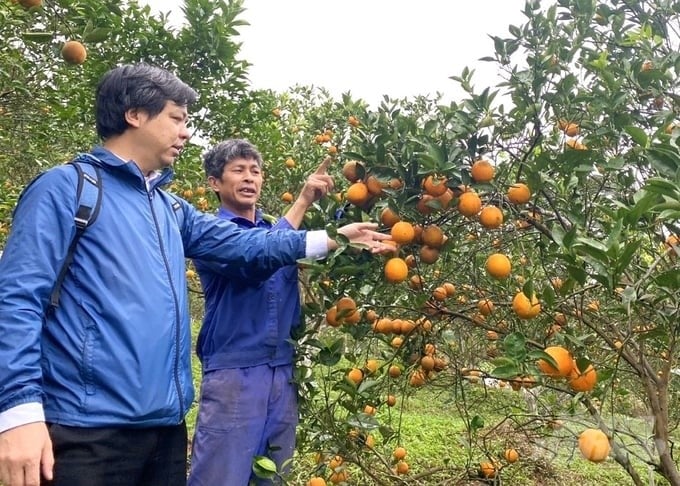May 29, 2025 | 19:41 GMT +7
May 29, 2025 | 19:41 GMT +7
Hotline: 0913.378.918
May 29, 2025 | 19:41 GMT +7
Hotline: 0913.378.918
Returning to Cao Phong orange barn (Hoa Binh) at this time, it is easy to see that in addition to focusing on restoring and replanting orange areas that have reached the end of the exploitation cycle and are infected with diseases, cooperatives and production households have made clear changes in applying new farming techniques in a safe and organic direction to minimize the use of chemical fertilizers and pesticides and protect the health of people, land, and the environment.

Cao Phong orange-producing cooperatives and households have made clear changes in applying new farming techniques in a safe and organic direction. Photo: Trung Quan.
Mr. Bui Van Dan, Head of the Cao Phong Department of Agriculture and Rural Development, said that after a period of overheated development, Cao Phong oranges are currently facing fierce competition in the market. This requires cooperatives and production households to proactively change farming habits and apply scientific and technical advances to reduce the amount of input materials and increase product quality and selling price. Households who are truly dedicated to orange trees have proactively joined together to establish production groups, cooperatives, and linkage chains to unify farming techniques and connect to consume products.
Another good sign is that many gardeners in Cao Phong have now boldly invested in organic orange production that strictly follows the principles of soil and environmental protection and initially achieves many extremely satisfactory results.
Ms. Vu Thi Le Thuy, Director of 3T Cao Phong Agricultural Product Cooperative (3T Farm), shared that the cooperative has more than 20 hectares of orange growing and nearly 100 hectares of production and consumption linkages with households. To protect the brand and increase competitiveness and product selling prices, the cooperative has agreed with members on newly planting areas that must use elite trees at reputable, inspected facilities; minimize chemical fertilizers and replace them with micro-organic fertilizers; and soak eggs, soybeans, fish, etc. with probiotics to fertilize plants.

Mr. Luong Van Thao (Ma 1 village, Bac Phong commune, Cao Phong district) said that thanks to organic farming, the planting soil has become more non-cohesive. Photo: Trung Quan.
For orange gardens in the early stages of construction, households intercrop short-day crops that can add nitrogen to the soil, such as soybeans, peanuts, mung beans, sesame, etc. For orange gardens that are healthy and have a closed canopy, gardeners maintain natural grass to keep the garden moist during the dry season, prevent erosion during the rainy season, and create a habitat for beneficial microorganisms in the soil as well as natural enemies.
For orange areas after harvest, gardeners fertilize with composted manure or vermicompost to increase nutrition, improve resistance for trees, and increase their ability to flower and fruit in the next crop.
Mr. Luong Van Thao in Ma 1 village, Bac Phong commune (Cao Phong district), said that in the past, due to a lack of knowledge, his family's orange growing mainly relied on experience and "picking up" from surrounding households. Whenever we see grass in the garden, we grub and clean it. When we see that the plants are not green, we fertilize them with nitrogen and phosphate. As a result, the soil becomes increasingly hard and infertile. Since 2020, with the support of 3T Cao Phong Agricultural Product Cooperative, his family has started to convert farming towards safety and organic farming.
According to Mr. Thao, this farming method increases the use of organic inputs, fertilizes, and sprays pesticides of the right type at the right time and dosage, and increases manual labor, helping his family reduce about 60% of chemical nitrogen, phosphate, and potassium. More importantly, garden soil is becoming more and more non-cohesive, with more and more earthworms.
“If calculated on 1 hectare, with a fish price of 5,000–6,500 VND/kg, it will cost about VND 10 million, plus more than VND 1 million to buy plastic containers and VND 800,000 to buy probiotics to compost so that fish nitrogen can be used to fertilize for the whole year. Self-making fish nitrogen to fertilize orange trees lets growers not have to worry about buying fake fertilizers, because currently on the market there are too many types of fertilizers whose quality cannot be distinguished with the naked eye. More dangerous is the type where the more you use it, the more it harms the soil and trees," Mr. Thao calculated.

Mr. Do Ngoc Ha, Lai hamlet, Tay Phong commune (right) said that organically grown oranges always have a selling price 10-15% higher than the average price. Photo: Trung Quan.
Mr. Do Ngoc Ha in Lai hamlet, Tay Phong commune, could not hide his joy when his family's 2 hectares of oranges, since switching to organic farming, always had a selling price 10-15% higher than the common ground.
According to Mr. Ha, orange trees are now grown in many places on a large area, saturating the market, so they cannot be grown in the short term but must make a difference in quality. To do that, first of all, growers need to prioritize the use of organic and micro-organic fertilizers combined with a balanced and reasonable use of inorganic fertilizers. This is a very important measure for restoring production capacity and increasing the fertility of degraded land.
"When the soil is improved and supplemented with nutrients, the plants will automatically grow healthily, have higher resistance to pests, and accordingly, the amount of input materials will also decrease.
Besides, it is mandatory to have a good set of varieties; do not plant many varieties in the same garden because the time and nutritional needs of varieties are different from each other. If intercropped, it will be very difficult to manage and care for them," Mr. Do Ngoc Ha shared.
Translated by Huyen Vu Thu
/2025/05/25/4127-3-073637_820.jpg)
(VAN) Thanks to the promotion from an FAO-implemented project, vegetable production in greenhouses in Moc Chau has seen strong development, from 1.5 hectares in 2021 to nearly 50 hectares in 2024.

(VAN) FAO has recently supported USD 140,000 to implement the project 'Risk mitigation human-animal interface risks through disease control initiatives in pig farming.'

(VAN) The People's Committee of Tra Vinh province has approved an adjustment to the investment policy for the Green Hydrogen Plant project, increasing its area to approximately 52.76 hectares.
![Reducing emissions from rice fields: [2] Farmers’ commitment to the soil](https://t.ex-cdn.com/nongnghiepmoitruong.vn/608w/files/news/2025/05/05/dsc08881jpg-nongnghiep-140632.jpg)
(VAN) Clean rice cultivation model in Thuong Tan commune, Bac Tan Uyen district, is assisting local residents in achieving sustainable agriculture by substantially reducing costs, increasing productivity, and protecting the environment.

(VAN) At the conference to disseminate Resolution No. 68, AgriS introduced its digital agricultural ecosystem and reaffirmed its commitment to accompanying the Government in promoting private sector development and sustainable agriculture.

(VAN) 'Blue Ocean - Blue Foods' initiative is designed to restore marine ecosystems and establish sustainable livelihoods for local communities by cultivating a minimum of 1,000 hectares of cottonii seaweed in the first three years.
/2025/05/21/4642-3-112707_603.jpg)
(VAN) The V-SCOPE project has made direct contributions to three out of six pillars of the Comprehensive Strategic Partnership between Vietnam and Australia.